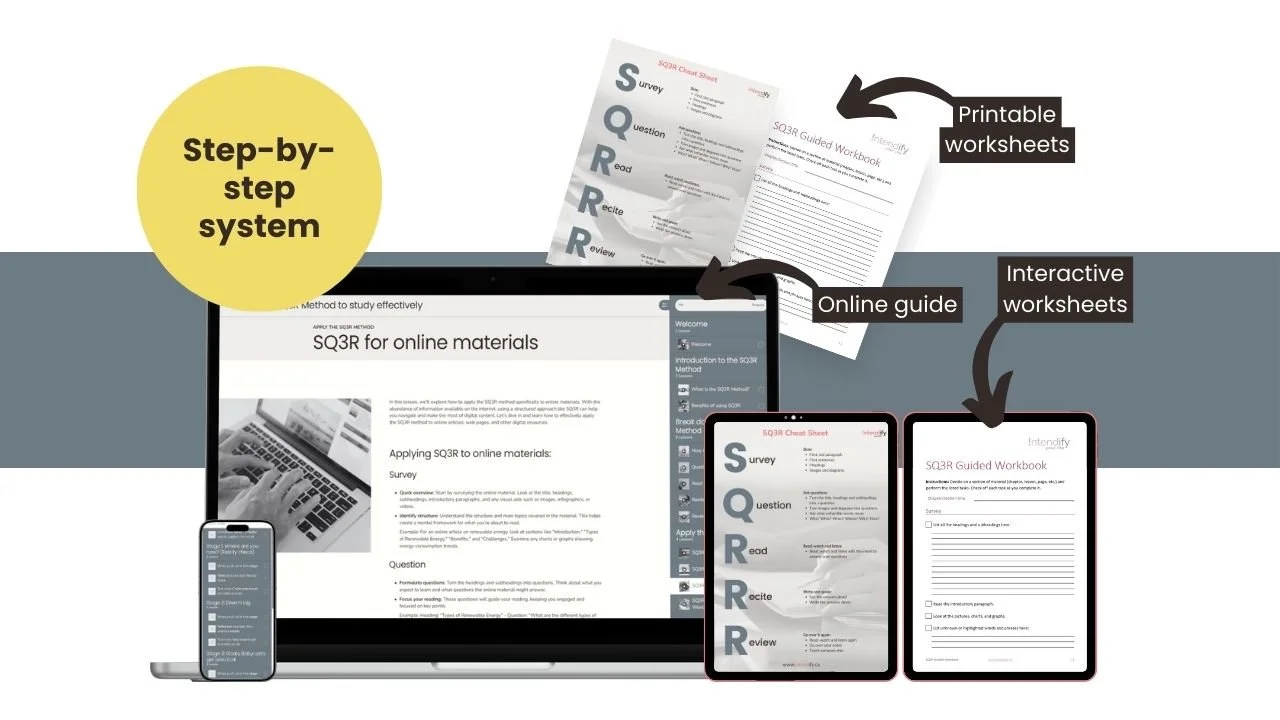How to become a good student: Find your struggle and fix it
This page is designed to help you understand why studying isn’t working the way you expect and where to adjust.
This guide isn’t theory. It’s shaped by years of coaching sessions, real conversations, and the practical shifts that people tested until they found what actually works.
If school feels harder than it should, you’re not broken, lazy, or bad at learning.
Most students who come to me saying, “I’m just not a good student,” are actually dealing with something far more specific. They don’t know how to study in a way that works for them, they can’t focus long enough to make progress, or their expectations are unrealistic. Stress takes over the moment they sit down to work.
Here’s the thing most people never tell you: being a “good student” isn’t a personality trait. It’s a set of skills. And like any skill set, gaps show up when no one ever taught you what to do next.
This guide is designed to help you stop guessing and start targeting the real issue. Not all of them. Just the one that’s holding you back right now.
You don’t need more pressure or better motivation. You need the right fix for the right struggle.
What it means to become a “good student”
Becoming a good student doesn’t mean turning into someone who loves every subject, studies for hours without distraction, or never procrastinates again.
It means:
You understand how to study instead of relying on guesswork.
Your effort leads to more consistent results.
You can focus long enough to make real progress, even on hard days.
School stress exists, but it doesn’t control your entire life.
You know how to adjust when something isn’t working instead of blaming yourself.
In real life, this often looks like finishing assignments without last-minute panic, walking into exams feeling prepared instead of desperate, and trusting your process instead of constantly second-guessing it.
What being a “good student” does not mean
Let’s clear this up early, because unrealistic expectations cause more damage than bad study habits.
Becoming a good student does not mean:
Straight A’s in every class.
Feeling motivated all the time.
Loving subjects that genuinely don’t interest you.
Having perfect focus, perfect routines, or perfect discipline.
If that’s the bar you’re aiming for, you’ll always feel behind, no matter how hard you try.
This guide works differently. Instead of asking you to overhaul your entire life, it helps you identify the one struggle that’s creating the most friction and shows you how to fix that first.
Because when one core issue improves, everything else gets easier too (yes, really).
Alex’s story (with permission)
When Alex first reached out, they were convinced their problem was focus.
They were spending hours “studying,” rereading notes, highlighting pages, watching review videos, and still walking into exams feeling foggy and unprepared. Their grades didn’t match the time they were putting in, and that gap was starting to mess with their confidence.
“I try so hard,” they said. “I just can’t stay focused. My brain shuts off.”
At first glance, that sounded right. Focus was an issue. But once we talked through what their study sessions actually looked like, something else became clear.
Alex didn’t know how to study.
No one had ever shown them how to actively engage with material, how to check their understanding, or how to practice recalling information. Their version of studying was passive, quiet, and exhausting. Their brain wasn’t shutting off because it was lazy. It was shutting off because it wasn’t being asked to do anything.
So we didn’t start with productivity tricks, timers, or discipline talk. We picked one class and changed one thing: how Alex studied a single chapter.
Instead of simply rereading, they used a simple active method. Instead of marathon cramming sessions, they worked in short blocks with a clear goal. Instead of waiting to feel “ready,” they practiced pulling information out of their memory, even when it felt uncomfortable.
Within a couple of weeks, two things changed:
First, Alex noticed they could focus longer without forcing it.
Second, they stopped panicking every time a test came up, because they finally trusted that their effort meant something.
The biggest change wasn’t their grades at first; it was that studying finally made sense. Alex trusted their effort, felt calmer going into exams, and stopped assuming they were the problem. And most importantly, Alex stopped telling themselves the story that they were “bad at school.”
They weren’t. They just needed to learn how to study effectively.
Why you should learn how to study effectively
Share this guide on Pinterest.
When school feels hard, most students assume they need to try harder, push longer, or somehow become more disciplined. That rarely works.
What actually happens is this: you spend more time studying, get inconsistent results, and start questioning yourself instead of your approach. Over time, that pattern creates stress, avoidance, and a quiet belief that maybe you’re just not cut out for school.
That belief does more damage than a bad grade ever could.
When you don’t know why something isn’t working, every assignment feels heavier than it needs to be. You procrastinate more, not because you’re lazy, but because starting feels risky. You second-guess your effort because you’ve been burned before. Even small tasks feel overwhelming when you don’t trust your process.
Fixing the right struggle changes that.
When you understand what’s actually getting in your way, you stop wasting energy on fixes that don’t work. You can make small, targeted changes that reduce stress and increase your confidence at the same time. Studying becomes something you do with intention instead of something you avoid or dread.
This isn’t just about school, either. Learning how to identify the real problem, adjust your approach, and recover from setbacks is a skill you’ll use far beyond the classroom. And the sooner you fix what’s breaking down now, the easier everything else becomes.
If you’re ready, the next section helps you identify which struggle is actually yours, so you can stop trying to fix everything and start fixing what matters most.
You might be thinking
-
What this usually means
Most students were never actually taught how to study. They were told to “review,” “prepare,” or “go over the material,” and expected to figure out the rest on their own.
So studying turns into rereading notes, highlighting textbooks, watching videos, or passively flipping through slides. It feels productive, but very little sticks. When exams come around, it feels like the information never really landed.
This isn’t a motivation problem. It’s a method problem.
What helps you move past it
Learning one simple, proven way to study and using it consistently, instead of switching strategies every time something feels hard.
You don’t need ten techniques. You need one that forces your brain to actively work with the material.
Quick wins
Try recall, not review: Take one page of notes, cover it up, and explain the main ideas out loud without looking. Then check what you missed.
Why it works: Memory strengthens when you practice retrieving information, not just when you reread it. Each time you “force recall,” you’re walking that memory path and making it easier to find again later.
Read: 5 ways to make SQ3R a habitMake a 3-question quiz: After class, write down three possible test questions based on what you just learned. Quiz yourself tomorrow without peeking at your notes.
Why it works: Turning notes into questions shifts you from passive learning (just reading) into active learning (anticipating and answering). This mirrors how you’ll be tested, which makes exams feel more familiar.Chunk and teach: Break a chapter into three “chunks.” Teach one chunk to someone else or even to your dog, your mirror, or your phone’s recorder.
Why it works: Teaching forces you to organize and simplify ideas. If you can explain it clearly, you understand it. If you stumble, you know exactly where to review.
Why this works
Learning happens when your brain retrieves information, not when it recognizes it on the page. Active study strengthens memory and understanding far more effectively than passive review.
Tools that might help
SQ3R Study Method Cheat Sheet (find it in the support section below)
Book: *Make It Stick: The Science of Successful Learning by Peter C. Brown, Henry L. Roediger III, and Mark A. McDaniel: Grounded in cognitive psychology, it shows why active recall, spaced repetition, and retrieval practice are so effective.
Book: *How to Become a Straight-A Student by Cal Newport: A practical guide with study strategies and tips that high-performing students actually use.
-
What this usually means
Your study sessions are too long, too vague, or happening in an environment that constantly pulls your attention elsewhere. Trying to “just focus” for hours at a time sets you up to fail. Your brain isn’t built for sustained attention without breaks, especially when tasks feel unclear or overwhelming.
What helps you move past it
Short, intentional study sessions with one clear goal.
Focus improves when your brain knows exactly what it’s supposed to do and when it’s allowed to stop.
Quick wins
Pomodoro block: Set a timer for 25 minutes. During that time, work on one single task. No multitasking, and no phone checks! After the timer finishes, take a 5-minute break.
Why it works: Your brain’s attention naturally works in cycles. Short bursts of focus followed by breaks prevent fatigue and keep your mind sharper.Environment reset: Clear just one corner of your desk (or table) and dedicate it only to studying. Put your phone in another room.
Why it works: Your environment cues your brain. A cluttered or distracting space splits your attention, while a dedicated “study zone” creates a mental habit of focus.Energy check: Before you start, drink a glass of water and do two minutes of stretching or deep breathing.
Why it works: Your brain is part of your body. Hydration and oxygen boost concentration, while a physical “reset” tells your nervous system it’s time to switch from rest to work mode.
Why this works
Clear boundaries reduce mental fatigue. When the task feels manageable, your brain resists it less.
Tools that might help
30-Day Challenge: Build strong study habits (find it in the support section below)
Book: *Deep Work: Rules for Focused Success in a Distracted World by Cal Newport: Explores why distraction kills productivity and how to cultivate deep, distraction-free work habits.
Book: *Hyperfocus by Chris Bailey: Offers neuroscience-based strategies to improve attention and reduce autopilot thinking.
Book: *The Organized Mind by Daniel J. Levitin: Uses cognitive science to explain how to manage information overload and focus more effectively.
-
Many students get caught in one of two traps:
Comparison: You see classmates who “get it” faster and assume you should too. Suddenly, your normal learning curve feels like failure.
OR
Perfectionism: You believe anything less than perfect isn’t good enough. That makes starting terrifying, because the pressure to deliver flawless work is paralyzing.
What this usually means
You expect yourself to perform at the same level every day, underestimate how long tasks take, or compare your progress to others without knowing their situation.
When expectations are unrealistic, even good effort feels like failure.
What helps you move past it
Planning based on your real energy, not your ideal self. Good students adjust their expectations instead of constantly pushing harder.
Quick wins
Set a “good enough” bar: Take one assignment and define what a 70% effort looks like. Do that first, then improve if you have time.
Why it works: Lowering the bar reduces fear of failure, which makes it easier to start. Progress builds confidence, and confidence fuels momentum.Redefine progress: Instead of aiming for a perfect final product, choose a process milestone like “Write the introduction paragraph” or “Outline three main points.”
Why it works: Shifting focus from outcomes to steps makes tasks manageable and prevents the all-or-nothing trap.Shift the comparison: Instead of measuring yourself against classmates, compare yourself to your past self. Are you improving in speed, clarity, or consistency?
Why it works: Self-referenced progress focuses on growing through effort and practice rather than natural talent. It makes learning a personal journey, not a competition.
Why this works
Realistic expectations reduce avoidance and help you build consistency instead of burning yourself out.
Tools that might help
Book: *You Are Awesome: Find Your Confidence and Dare to Be Brilliant at (Almost) Anything by Matthew Syed: Encourages a growth mindset, resilience, and building confidence through effort and practice.
Book: *Letting Go of Perfect by Jill Adelson & Hope Wilson, or Moving Past Perfect by Tom Greenspon: Teach how to overcome perfectionism and reframe self-worth around progress, not perfection.
-
Procrastination usually isn’t about laziness. More often, it’s your brain avoiding discomfort. When you look at a big, unclear task like writing a research paper, it can feel overwhelming. That discomfort often makes you avoid doing the thing, and doing literally anything else will feel better in that moment. Add in a touch of perfectionism (“If I can’t do it perfectly, why even start?”) and you’ve got the perfect recipe for putting things off.
Another factor is time blindness (underestimating how long things actually take). Without breaking assignments into smaller steps and attaching them to deadlines, it can be really easy to lose track until that last-minute panic kicks in.
Think of procrastination like standing at the bottom of a huge staircase. If the only option is to leap to the top in one jump, you’ll freeze. But if you focus on the first step, the climb suddenly feels doable.
What this usually means
Tasks feel vague, overwhelming, or emotionally loaded. Waiting until the deadline creates urgency, which temporarily cuts through that discomfort.
Procrastination isn’t laziness. It’s a coping strategy.
What helps you move past it
Breaking work into visible, non-threatening steps and starting before you feel ready.
Quick wins
Two-minute start: Tell yourself you’ll only work on the task for two minutes. Start by opening the file and writing a rough title.
Why it works: Once you get started, momentum kicks in, and it’s much easier to keep going than it is to start.Break it once: Take one assignment and split it into three mini tasks (e.g., research → outline → draft).
Why it works: The smaller the step, the less resistance your brain feels. Being clear helps you stop avoiding the task.Deadline pull-forward: Give yourself a personal due date two days earlier than the real one. Put it in your calendar.
Why it works: Fake deadlines trick your brain into spreading effort out, reducing the last-minute crash.
Why this works
Momentum lowers anxiety faster than motivation ever will.
Tools that might help
30-Day Challenge: Build strong study habits (find it in the support section below)
Book: *Atomic Habits by James Clear: Breaks down how small habit changes, incremental improvements, and environmental design help beat procrastination and build consistency.
-
Motivation drops when you can’t see the point. If the subject feels disconnected from your life, your brain labels it “low value.” External pressure (grades, parents, professors) can push you for a while, but true motivation comes from finding a personal link.
Motivation also thrives on immediate rewards. If the only payoff is a grade at the end of the semester, your brain will gravitate toward instant pleasures like scrolling or hanging out with friends.
Think of motivation like fuel in a car. External pressure is like being pushed. You’ll move for a while, but it’s exhausting. Internal motivation is like filling the tank. It’s smoother, longer lasting, and less painful.
What this usually means
You don’t see how the material connects to your goals, or past struggles have drained your interest. Lack of caring often follows repeated frustration, not the other way around.
What helps you move past it
Shifting the goal from enjoyment to usefulness. You don’t need to love every subject. You just need a reason to engage with it.
Quick wins
Find a hook: Ask yourself, “How could this subject connect to something I care about?” Write down one link (e.g., math → budgeting for travel).
Why it works: Relevance increases your brain’s willingness to engage.Reward yourself: Pair study with a small treat (25 minutes of work = 10 minutes of something fun).
Why it works: Immediate rewards keep your dopamine system engaged, making effort feel less painful.Shift perspective: Imagine you’re teaching the topic to someone younger.
Why it works: Simplifying and reframing the material makes it more approachable and helps you notice interesting angles you might have missed.
Why this works
Understanding creates engagement. Engagement rarely appears first.
Tools that might help
Book: *Make Time: How to Focus on What Matters Every Day by Jake Knapp & John Zeratsky: Helps you design your day around meaningful, energizing priorities and makes room for motivation.
-
Your environment is like an extra teammate in your study process. A cluttered desk, noisy background, or constant notifications all compete for your attention. Each small distraction pulls a piece of focus away, leaving you mentally drained faster.
Environment also includes support systems. If your family or roommates interrupt or don’t respect your study time, staying focused feels nearly impossible. Without a reliable study spot or boundaries, your brain wastes energy trying to tune out chaos instead of learning.
Imagine trying to run a race with someone tugging at your sleeve every 30 seconds. That’s what studying in a messy, distracting environment feels like.
What this usually means
You study wherever you land, surrounded by unfinished tasks, clutter, and distractions. Starting feels heavier than it should because your environment quietly drains focus before you even begin.
What helps you move past it
Creating one reliable, low-effort study setup.
Quick wins
Clear one corner: Instead of tidying your whole space, clear just one desk or table spot.
Why it works: A small, defined “study zone” gives your brain a visual cue that it’s time to focus.Noise control: Use instrumental music, white noise, or headphones to block interruptions.
Why it works: Steady background noise reduces the brain’s impulse to pay attention to every sound.Phone exile: Place your phone in another room for one study block.
Why it works: Removing the temptation removes the distraction. Out of sight really is out of mind.
Why this works
Your brain reads clutter as unfinished work, which increases stress and avoidance.
Tools that might help
Book: *Getting Things Done (GTD) by David Allen: While classic productivity, its systems for clearing mental clutter and organizing tasks are valuable in creating a clutter-free, focused study environment.
-
Stress and anxiety hijack your brain. When your body goes into fight-or-flight mode, energy shifts away from the parts of your brain responsible for memory and focus. That’s why you can know the material at home but blank during an exam; your nervous system thinks the test is a threat.
Perfectionism makes this worse. If every mistake feels catastrophic, you’ll study in a constant state of tension. Without stress-management habits, school stops being a challenge and starts being a source of chronic anxiety.
Think of it like trying to pour water into a glass that’s already overflowing. Until you calm the spill, nothing new can go in.
What this usually means
Studying has become emotionally charged. Your body associates schoolwork with threat, failure, or pressure, so your nervous system stays on high alert. Learning becomes harder when your brain is busy protecting you.
What helps you move past it
Regulating stress before trying to improve performance.
Quick wins
Box breathing: Inhale for 4, hold for 4, exhale for 4, hold for 4. Repeat three times.
Why it works: Slowing your breath tells your body it’s safe, lowering stress hormones and clearing mental fog.Mistake reframe: When you make an error, write: “This is feedback, not failure.”
Why it works: Shifting your inner script reduces perfectionism’s grip and helps you keep moving forward.
Read: How to overcome your fear of failure and take action anywayMini break ritual: After every 25 minutes of study, take a 5-minute walk or stretch.
Why it works: These resets prevent your nervous system from staying stuck in “overdrive” and make focus easier to regain.
Why this works
A regulated nervous system processes and retains information more effectively.
Tools that might help
Book: *Quiet: The Power of Introverts in a World That Can’t Stop Talking by Susan Cain: Helps students understand their internal world, recharge without noise, and manage stress in environments that favor extroversion.
*Heads-up: Some of the links on this page are affiliate links, which means I may earn a small commission if you choose to make a purchase, at no extra cost to you. I only recommend tools and resources I genuinely believe are helpful. Thank you for supporting the work I do here.
Where to start
Reflection exercise
Before you try to change anything, it helps to get clear on where you are right now and what you actually want to feel different.
Describe your current reality
Think about your day-to-day experience as a student.
What feels hardest right now?
What patterns keep repeating, even when you try to fix them?
When you sit down to study, what usually goes wrong first?
Write what’s true, not what you think should be true.
Describe your ideal
Now imagine this part of your life working better, not perfectly, just better.
What would feel easier?
What would you feel less stressed or anxious about?
What would tell you that studying is finally working for you?
Focus on realistic changes you could notice within a few weeks.
Why this matters
When you skip this step, it’s easy to chase every possible fix and end up not making a difference. Clarity helps you choose one starting point instead of trying to fix everything at once. That’s how real progress happens.
Once you’ve named your current reality and your ideal, look back at the sections above and choose the struggle that fits best right now. Start there.
You can always adjust later.
Do you want support with this?
Make steady progress with the course: Use the SQ3R method to study effectively
When this is right for you: You want more than a quick tip. You’re ready to learn why the SQ3R method works and how to apply it confidently across different subjects.
How this can help: This course breaks the SQ3R method into clear, manageable steps and shows you how to use it in real study situations. You’ll build a repeatable study process you can rely on, instead of constantly second-guessing whether you’re studying “the right way.”
Make lasting change with one-on-one coaching
When this is right for you: You’ve tried tools or strategies, but something still isn’t working. You want help figuring out your specific struggle and need guidance that adapts to your learning style, schedule, and stress level.
How this can help: In one-on-one coaching, we focus on what’s actually getting in your way. Together, we identify the real problem, choose strategies that fit your situation, and adjust them as you go. This support helps you build a study approach that works consistently, not just in theory but in real life.
Every student has a different gap. Yours might be skills, focus, mindset, time, motivation, environment, or emotions. The answer isn’t to grind harder; it’s to notice where you’re getting stuck and match it with the right fix.
Start with one of the quick wins today. Then, try the tools that address your gap, so you’re not just working more; you’re working smarter.
FAQs - Questions my clients ask
-
Skim the statements in the list at the top of this page and pick the one that stings a little. If you check several, start with the biggest friction point, try the quick wins for one week, then move to the next gap.
-
Active recall means trying to retrieve key ideas from memory without looking, then checking what you missed. Retrieval strengthens memory pathways. Rereading and highlighting are passive; they feel productive but build shallow recognition instead of recall.
-
Most brains focus best in 20–40 minute blocks. Use a Pomodoro: 25 minutes of single-task focus, then a 5-minute break. Do 2–4 rounds, take a longer break, and repeat as needed.
-
Shrink the task and start. Use a two-minute start, break the assignment into three tiny steps (research → outline → draft), and pull one mini-deadline two days earlier in your calendar to spread effort out.
-
Create a defined study zone by clearing one desk corner, use headphones or steady background audio for noise control, and put your phone in another room for one study block. If home is chaotic, try a library nook or quiet campus space.
-
Find a personal hook. Connect the topic to something you value (skills for your field, budgeting, storytelling). Pair study blocks with small rewards and reframe the lesson as something you could teach simply to someone younger.
-
Use a pre-test routine: box breathing (4-4-4-4 for three rounds), a quick stretch or short walk, and a reminder sentence like 'This is feedback, not failure.' Practice active recall during prep so exam questions feel familiar.
-
Keep the standard, change the steps. Define a 'good enough' version for today (e.g., outline two sections instead of a perfect full draft). Measure progress against your past self and stack small wins to build momentum.
-
Pick one quick win for your biggest gap and do it daily for a week. Add a second only after the first feels easy. Simplicity beats overwhelm and consistency beats intensity.
-
Many students notice changes within a week; better recall from active practice, more done with 25-minute blocks, or lower stress from a pre-study ritual. Bigger shifts stack over 2–4 weeks as habits settle in.

















Want to help your kid succeed in college or university? Don’t make them go. Now hear me out. If your kid knows exactly what they want to do as a career and they are excited to learn what they need to know, then by all means! But, if they are like millions of young people who don’t have a clue what they want to do, maybe there’s another path.